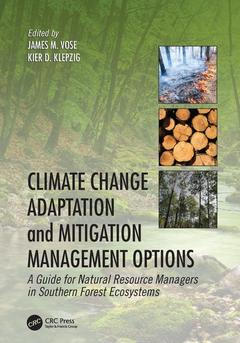Climate Change Adaptation and Mitigation Management Options A Guide for Natural Resource Managers in Southern Forest Ecosystems
Coordonnateurs : Vose James M., Klepzig Kier D.

Forest land managers face the challenges of preparing their forests for the impacts of climate change. However, climate change adds a new dimension to the task of developing and testing science-based management options to deal with the effects of stressors on forest ecosystems in the southern United States. The large spatial scale and complex interactions make traditional experimental approaches difficult. Yet, the current progression of climate change science offers new insights from recent syntheses, models, and experiments, providing enough information to start planning now for a future that will likely include an increase in disturbances and rapid changes in forest conditions.
Climate Change Adaptation and Mitigation Management Options: A Guide for Natural Resource Managers in Southern Forest Ecosystems provides a comprehensive analysis of forest management options to guide natural resource management in the face of future climate change. Topics include potential climate change impacts on wildfire, insects, diseases, and invasives, and how these in turn might affect the values of southern forests that include timber, fiber, and carbon; water quality and quantity; species and habitats; and recreation. The book also considers southern forest carbon sequestration, vulnerability to biological threats, and migration of native tree populations due to climate change.
This book utilizes the most relevant science and brings together science experts and land managers from various disciplines and regions throughout the south to combine science, models, and on-the-ground experience to develop management options. Providing a link between current management actions and future management options that would anticipate a changing climate, the authors hope to ensure a broader range of options for managing southern forests and protecting their values in the future.
Introduction to Climate Change Adaptation and Mitigation Management Options. Framing the Future in the Southern United States: Climate, Land Use, and Forest Conditions. A Conceptual Framework for Adaptive Forest Management under Climate Change. Water Stress and Social Vulnerability in the Southern United States, 2010-2040. Future Wildfire Trends, Impacts, and Mitigation Options in the Southern United States. Climate-Induced Changes in Vulnerability to Biological Threats in the Southern United States. Adapting Silviculture to a Changing Climate in the Southern United States. Productivity and Carbon Sequestration of Forest in the Southern United States. Managing Forest Water Quantity and Quality Under Climate Change. Climate-Induced Migration of Native Tree Populations and Consequences for Forest Composition. Climate Change and Wildlife in the Southern United States: Potential Effects and Management Options. Climate Change and Outdoor Recreation Participation in the Southern United States. Summary of Findings, Management Options, and Interactions.
James M. Vose, Ph.D., is a research ecologist and project leader of the USDA Forest Service, Southern Research Station, Center for Integrated Forest Science (CIFS) at North Carolina State University in Raleigh, North Carolina. Prior to his current appointment as project leader of CIFS, he spent 25 years at the Coweeta Hydrologic Laboratory studying watershed ecosystem responses to disturbances and forest management. He has authored more than 170 scientific papers and serves as adjunct faculty at the University of Georgia, Virginia Tech, and North Carolina State University. He recently served as a co-lead author for the USDA National Climate Assessment Forest Sector Report published in 2012.
Kier D. Klepzig, Ph.D., is an entomologist and assistant director of the USDA Forest Service, Southern Research Station in Asheville, North Carolina. Prior to his current appointment, he spent 14 years as a research entomologist and project leader of the Insects, Diseases, and Invasive Plants Research Unit in Pineville, Louisiana. He studied bark beetle fungal interactions and symbiosis. He has authored more than 90 scientific papers, and serves as an editor for Environmental Entomology. He recently served as a coeditor and coauthor of the landmark book SPBII. He is the most recent winner of the A.D. Hopkins Award for excellence in forest entomology.
Date de parution : 11-2016
17.8x25.4 cm
Date de parution : 12-2013
Ouvrage de 400 p.
17.8x25.4 cm
Mots-clés :
Case Study; Southern United States; Climate change; Loblolly Pine; Climate change adaptation; Longleaf Pine; Climate change mitigation; Shortleaf Pine; Climate change threats to southern forests; HadCM3 B2; Adaptive management; Climate Scenarios; Carbon management and mitigation; Slash Pine; Ecosystem services; General Circulation Model; A1B Climate Scenarios; Spruce Fir Forests; Storyline B2; A1B Scenario; Capita Participation; BA Increment; Southern Pine Beetle; Sea Level Rise; Eastern Woodrats; Overcup Oak; Southern Red Oak; Indiana Bats; Selected Tree Species; Future Forest Conditions; Elevated CO2; Hemlock Woolly Adelgid



